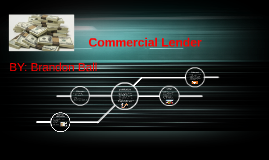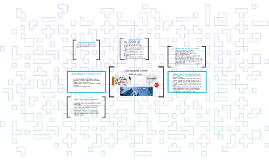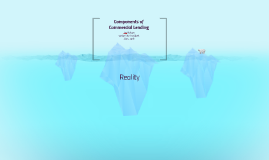Commercial Lending
Transcript: By: Samyuktha Ravi Commercial Lender Wharton School of Business at UPenn Salary Bedminister, Nj The End! 2. Peapack-Gladstone Bank: Is a commercial bank that provides innovative private banking services to businesses, non-profits and consumers that help them to establish, maintain and expand their legacy. They offer commercial banking services, personal banking services and private banking services. Their commercial loans range from $10,000 to $12 million. A commercial lender earns around $50,500 to $80,000 per year. This salary range only accounts for commercial lenders with zero to three years of experience. After three to five years on the job, however, commercial lenders are offered 65,750 to $103,250 per year. After five or more years of experience, they can expect to earn $86,000 to $120,750 per annum. On top of experience, education directly affects salaries. Commercial lenders with master’s degrees in finance, business or economics earn more than their colleagues with bachelor’s degrees. It is estimated that lenders with post-secondary degrees earn 5 percent to 10 percent more than average. The form of compensation varies widely by employer. Some loan officers are paid a flat salary; others are paid on commission. Those on commission usually are paid a base salary plus a commission for the loans they originate. Loan officers also may receive extra commission or bonuses based on the number of loans they originate or how well the loans do. Commercial Lenders in NJ Training: Employers provide on the job training. This may be a combination of formal, company-sponsored training and informal training during the first few months on the job. Those who use underwriting software often take classes to learn the company’s software programs. Advancement opportunities: Capable loan officers may advance to larger branches of the firm or to managerial positions. while less capable workers—and those having weak academic preparation—could be assigned to smaller branches and might find promotion difficult without obtaining training to upgrade their skills. Advancement beyond a loan officer position usually includes supervising other loan officers and clerical staff. “We turn Knowledge into Action” --The administrators look at: High school academic performance ,Standardized testing, Recommendations, Non-scholastic achievements, Leadership, Personal maturity. --The undergraduate admissions committee looks for individuals who will be future leaders. There are no fixed criteria and no cut-offs in terms of grades or test scores Cost of a degree: around $59,736 per year. (varies depending on the programs and courses you are taking) Time frame for UG: 4 years Business Alumni: Warren Buffet (Berkshire Hathaway; dropout), Donald Trump (Trump organization), John Scully (Apple and Pepsi), Anil Ambani (Reliance Group), Leonard Lauder (Estée Lauder), Peter Lynch (Fidelity) They offer too many degrees, including BS, PHD, MBA,BS/BA, BS/BSE/BAC,MPA,ID,MPP. Mainly- Bachelor of Science in Economics. They offer internships with your course of study and the salary varies but on an average, it is $8000. Minimal qualifications/Education: a bachelor’s degree in business/finance or something related to that-sufficient to enter the field. Work experience in a related field is not a requirement for this occupation. Because commercial loan officers analyze the finances of businesses applying for credit, they need to understand general business accounting, including how to read financial statements. Some loan officers may be able to enter the occupation without a bachelor’s degree if they have related work experience, such as in sales, customer service, or banking. Federal law requires that all loan officers obtain state licensing. The licensing requirements include attending a 20-hour course, passing an exam, passing a background check and not having any felony convictions. Commercial Lenders: are financial institutions that offer loans backed by hard collateral to commercial enterprises. It’s often up to the commercial lender, a.k.a Commercial Loan Officer whether a business is considered a good candidate for a loan. loan officers use a process called underwriting to assess whether applicants qualify for loans. After collecting and verifying all the required financial documents, the loan officer evaluates this information to determine the applicant’s loan needs and ability to pay back the loan. Some firms underwrite loans manually, calculating the applicant’s financial status by following a certain formula or set of guidelines. Other firms use underwriting software, which analyzes applications almost instantly. More often, firms use underwriting software to produce a recommendation, while relying on loan officers to consider any additional information to make a final decision. Commercial Lenders Requirements Commercial Loan officers generally: --Contact companies or people to ask if they need a loan --Meet with loan applicants to gather

















